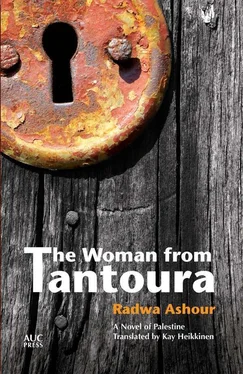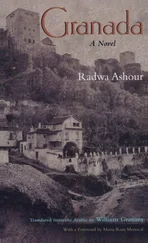O tall one, O handsome, you who’ve been spoiled,
If you go to the well, think how to climb out.
We’re scattered, it’s for God to bring us back;
Our Lord scatters and he gathers, that we know.
The girl from Saffurya came into the house, lived in it, and spread out. My poor aunt found herself cramped in a space that was ever smaller, as “the stranger” (as she called her in her absence) shared in ordering the house, and what will we cook today and how will we cook it, and “this couch is better here,” and “having this window closed makes the house stuffy, it’s better if we keep it open,” and “never mind, Aunt, I’ll cook.” My aunt complains to me in whispers, looking around her. “She has your uncle and your cousin completely fooled. Even the kids are fooled. She’s strong, the girl from Saffurya!” Or again, “Thank God they live in the camp. If Ezz had married her when we were in the village he would have lived in their village, and we would only have seen him on holidays.”
Since most of the residents of Saffurya were refugees in Lebanon, the whole village and not just the bride came into Abu Amin’s house. It was a dense presence that made my aunt feel as if she didn’t have any extended family around her, and that my uncle welcomed joyfully. His daughter-in-law brought him her family who became a family for him; in fact she brought Saffurya itself with her, to become part of his story. He would recount what happened in it, and it came to seem as if he had been there when the people were forced to leave it for Rumaysh. In fact, one morning he decided, “We have a duty that we cannot neglect,” so he went to Rumaysh to meet the family that had hosted his in-laws the day they left their village, taking with him a “worthy” gift of fish. He thanked them and invited them to visit him in Sidon, and held a banquet for them as if they were his in-laws and not a family who had hosted the family of a girl who would become his daughter-in-law, nine years later.
But he did not go often to the camp. He only went there if he had to.
“He was standing in the station waiting to get on the train, returning to where he had come from, so how absurd it was to ask him to register his stop and to get an identity card for waiting.” I said that before, describing my uncle Abu Amin. I re-examine it. It’s not absurd for us to get an identity card to wait. And anyway, an identity card is always condensed, a summary of a long, complicated story, stretched out over time and not susceptible to a summary. It’s an insufficient shorthand, but it’s an indication.
Waiting.
All of us know waiting.
To wait an hour, a day or two, a month, or a year or perhaps years. You say it’s been a long time, but you wait. How long can we wait? Maryam told me about a woman who waited for her husband for twenty years. I said, “Tell me more.” She said, “It’s a well-known story in ancient literature. The man went to war, and the war lasted ten years. On his way home he got lost.” “Who got lost?” I asked. She said the man’s name, a strange name that’s hard to remember. She said, “He was lost for ten more years, and the wife was still waiting. Men were hovering around her, desiring her and asking her to marry them, and she was weaving on her loom, saying, ‘When I finish weaving I will accept one of you.’ She would weave on her loom during the day and at night she would undo the weaving.” I was drawn to the story, but I said to myself that it fell short, that waiting is not like that, it’s inseparable from life and not a substitute for it. You wait at the train station, and at the same time trains take you east and west and north and south. You have children and you raise them, you study and move on to a job, you love and you bury your dead, you rebuild the house that collapsed on your head, you erect a new house. A thousand details take your attention, that’s the wonder, as you are waiting in the station. What are you waiting for? What is Ruqayya, in particular, waiting for?
Thinking exhausts her. Putting it all into words exhausts her, but she knows that while she was waiting, she had three children. At the station. Amin planted the sperm, and under the umbrella of waiting she bore a child she named Sadiq, then followed him with a second child she named Hasan, and after them came Abd al-Rahman.
Like a newborn puppy whose eyes are still closed, the boy looks for the nipple of the breast, knowing his way by feel or scent, and learns how to nurse. He grows a little and his small, soft hand closes over her finger, gripping it with his fist. He crawls. He coos like the birds. He walks. He forms meaningful sentences, then takes off talking. He runs. To school. To the university. To women. To a home of his own, and children. The scene shifts as if in a film that sums up whole lives in two hours. Ruqayya at less than fourteen, following her mother on the way to Sidon, without speaking. Ruqayya at less than fifteen being married to Amin. Ruqayya at twenty-four with three children, the youngest a nursing baby. With Amin in Beirut. The children in schools. The children in universities. In the demonstrations. Behind a barricade, threatened by another barricade in front of them. The children in airplanes. Ruqayya sitting on the stairs during the shelling of Beirut, bent double until her head nearly touches her knees, holding Maryam who had fallen to her as if from the sky. We begin again. Maryam crawls. Maryam walks. She forms meaningful sentences. She runs to school. To the university.
A story that can’t be summarized.
And then, what is the place of fear in the way station?
Fear is hidden away like inner waters, present in waking and in sleep. Open fear when the city suddenly shakes. A few moments and then she notices that the building that has turned into a heap from which smoke and flames are rising, by some incomprehensible accident, is the neighbors’ building and not the one she lives in.
A story that can’t be summarized.
Waiting had an independent existence, true, more like the earth we stand on. But that other thing also had always been there, piling up intentions that announced themselves suddenly. How else could I explain my uncle Abu Amin’s behavior and what happened after 1967, and that sudden change in the camps? (Was it really sudden, or was it a natural move, the result of what had gone before?) The change was clear in the faces of the girls and the young men, in the look in the eyes, in the stance, the walk, the gesture, and the sense of the place. Would that Maryam were here so I could ask her to give me more details of the story of the woman who waited twenty years. Penelope. She said that her name was Penelope. No one undoes their weaving even if it looks that way. No one is frozen in the act of waiting.
My uncle continued his trips infiltrating the country. I can’t report the details because I don’t know them, and because Abu Amin, so enamored of talking and telling stories, kept silent about his trips. He would absent himself from the house, a week or two or sometimes a month; it would seem as if he had gone to sea with the fishermen. Then my aunt’s fears and later the fears of us all as we waited for his return would confirm that we knew what he had not told us, and that he had gone there. To do what? Did he go alone or with others? Did he plan and set a goal that called for the risk, or did he go only because he wanted to? He did not say, and we could only imagine.
When Abd al-Nasser’s voice rang out from the pulpit of al-Azhar one Friday in the fall of 1956, Sidon and Tyre and Nabatiyeh and Bint Jbeil and other villages and towns listened exactly as they listened in the camps. The little ones, with that wondrous spring in their knees, suddenly leapt from childhood to youth. And it seems that the spring wasn’t limited to the knees, that spring that stretched them not by one hand span but by two. Did the camp also have knees and a spring, to take it from one state to another insensibly and with no notice? Did it demand of the camp also, like them, that it sit once again before the photographer so he could take a picture that reflected its new shape?
Читать дальше












